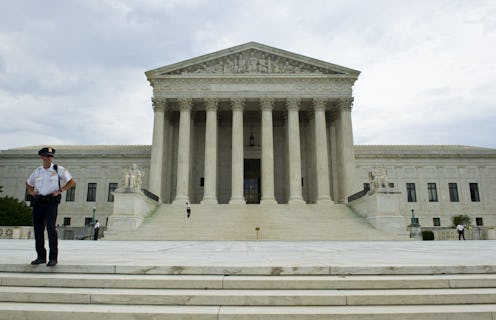News
SCOTUS Will Take On The Death Penalty Soon
Two major cases are hitting the Supreme Court in April, including one on the death penalty. Just a day after the high court is scheduled to hear arguments on same-sex marriage, the Supreme Court will take up lethal injection — specifically, whether or not new and untested drug cocktails are constitutional under the Eighth Amendment. The date of the hearing for Glossip v. Gross has been set for April 29.
The Supreme Court first announced that it would be taking up the controversial issue in late January, as anger and distrust over the experimental cocktails mounted in states that allow the death penalty. The case was brought before the high court by four death row inmates in Oklahoma. One of the plaintiffs, Charles Warner, was executed before the nine justices agreed to hear the case.
A few days after announcing it would hear arguments on the constitutionality of midazolam and the use of the potentially dangerous drug cocktails, the Supreme Court stayed the executions of three men on death row in Oklahoma. "It is hereby ordered that petitioners' executions using midazolam are stayed pending final disposition of this case," the high court said in its order.
2014 saw executions from Ohio to Oklahoma to Arizona ending up botched, with death row prisoners writhing, gasping, and suffocating for minutes or even hours after the lethal dose was given. All of the botched executions included the sedative midazolam, either on its own or mixed in with other powerful drugs.
Several other states, including Florida and Pennsylvania, have also put executions on hold as the Supreme Court analyzes the legality of these drug cocktails. On Tuesday, Georgia's Department of Corrections said in a statement it would be suspending the lethal injections of two prisoners scheduled to be executed this week "out of an abundance of caution." State officials later said all executions would be suspended indefinitely in Georgia as the drug midazolam is under review.
This will be the first time the Supreme Court has made a decision on the death penalty since 2008, when the high court ruled that lethal injection was allowed under the Eighth Amendment. Although that case, Baze v. Rees, approved the use of a three-drug cocktail in lethal injections — the primary execution method of state and federal governments — the ruling also set up a possibility for a challenge. In his concurring opinion, Justice John Paul Stevens wrote a chillingly prophetic message:
I assumed that our decision would bring the debate about lethal injection as a method of execution to a close. It now seems clear that it will not. The question whether a similar three-drug protocol may be used in other States remains open, and may well be answered differently in a future case on the basis of a more complete record. Instead of ending the controversy, I am now convinced that this case will generate debate not only about the constitutionality of the three-drug protocol, and specifically about the justification for the use of the paralytic agent, pancuronium bromide, but also about the justification for the death penalty itself.
Images: Getty Images (2)
